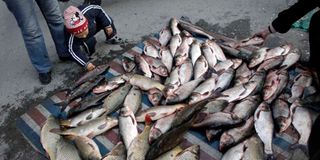Taiwan tosses fish ‘poached’ by Chinese vessel back into sea

A boy plays with fish on sale on a street in Shanghai, China. Taiwanese authorities have tossed more than 700 kilos of fish captured by a Chinese vessel back into the sea as punishment for poaching, officials said.
Taiwanese authorities tossed more than 700 kilos of fish captured by a Chinese vessel back into the sea as punishment for poaching, officials said, even as Beijing warned the island is its territory.
The Taiwanese Coast Guard Administration said last week it had pursed a Chinese vessel which had “strayed” into Taiwanese maritime boundary near the island of Penghu.
According to Taiwan’s Central News Agency (CNA), the boat, identified as Aonanao 3120, and its 13-member crew, was carrying the fish caught in waters Taiwan considers its jurisdiction, without permission.
“The patrol boat broadcast three radio messages ordering the vessel to stop for inspection, but the Chinese crew attempted a speedy getaway and even threatened the Coast Guard officers by brandishing knives and iron rods,” the agency reported.
“In the end, the officers successfully boarded the vessel after taking out their shotguns and found 760 kilogrammes of fish on board, which they dumped back into the ocean.”
Illegal fishing
The incident is one of several reported by countries sharing a maritime border with China or in the wider Pacific and elsewhere, who accuse fishing vessels from China of “poaching” fish in their respective territories.
In January, the Island of Vanuatu detained Chinese fishing vessels for fishing illegally. It was two months after another vessel from China and 28 crew were detained in the island of Palau for illegal fishing.
In Africa, Sierra Leone, South Africa, Guinea and Mozambique have all arrested illegal fishing vessels with Chinese flags, in the recent past.
In April, Sierra Leone said it was detaining two vessels caught fishing in its waters without local licences.
Prosecute fishermen
The Taiwan Coast Guard, which patrols the fish-rich waters, said it will prosecute the fishermen according to a law that governs relations between Taiwan and Mainland China, for crossing into Taiwan illegally.
The vessel, officials said, is the sixth since May this year from Mainland China to cross into Taiwan without permission. Taiwan routinely restricts fishing in the summer season in its waters, ostensibly to allow fish to regenerate.
According to the CGA, six Chinese fishing boats have been caught poaching in waters near Penghu since May, when an annual three-month summer fishing ban in waters to the north, east and south of China began.
But the move came as China intensified its hard power to contain Taiwan, an Island it considers part of its wider territory.
During celebrations to mark the Communist Party’s centenary last week, President Xi Jinping said his government will not compromise on the stance that Taiwan is part of China.
One-China principle
“We will uphold the One-China principle and the 1992 Consensus, and advance peaceful national reunification.
“We must take resolute action to utterly defeat any attempt toward ‘Taiwan independence’, and work together to create a bright future for national rejuvenation,” Xi told a gathering in Beijing on July 1.
Officially known as the Republic of China, Taiwan, has faced the might of China’s foreign lobbying against recognising Taipei as a separate independent capital.
In Africa, only the Kingdom of Eswatini, for example, still recognises Taiwan as independent of China. Burkina Faso, the other country that supported Taiwan changed its stance in 2018 after an intense lobbying from Beijing.
Both sides actually recognise the existence of One China, although Taiwan believes it is the true China.
Initially one territory, the split arose in 1949 after the Communist Party defeated the Nationalists in a war. The latter set up an administration in Taipei. Beijing would later in 1971 be recognised as the true occupant of the UN Security Council seat for China.
Taiwan regards itself as a democracy, off the south eastern coast of mainland China.




